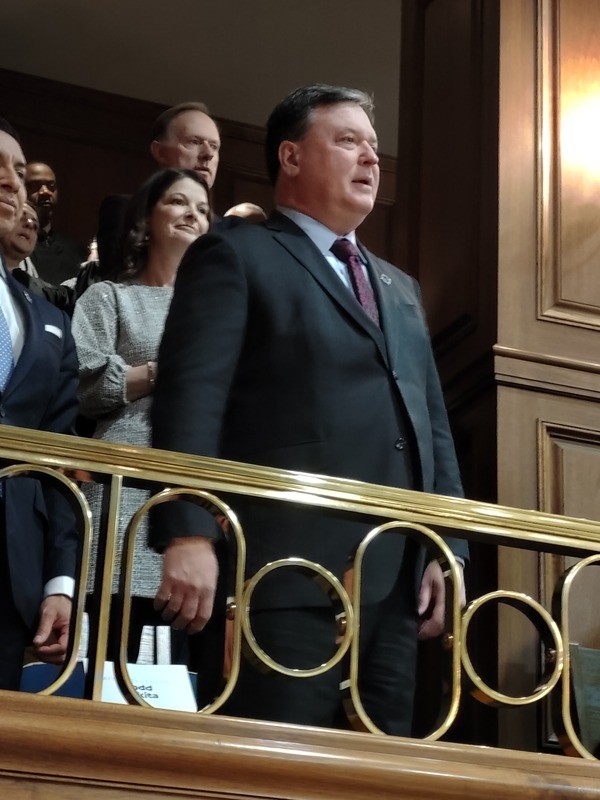
Indiana Attorney General Todd Rokita visited the Indiana House of Representatives to hear Indiana Chief Justice Loretta Rush deliver the 2024 State of the Judiciary speech in January. (Photo/Marilyn Odendahl)
By Marilyn Odendahl
The Indiana Citizen
February 1, 2024
The conditional agreement and affidavit that Indiana Attorney General Todd Rokita signed, consenting to a public reprimand to end the attorney disciplinary case that had been filed against him for his actions toward Indianapolis OB/GYN Dr. Caitlin Bernard, has been released to the public.
The Indiana Supreme Court issued the order to release the documents Thursday.
As the Supreme Court’s order noted, the conditional agreement does not contain much more information than what the justices included in their ruling on the disciplinary case. Namely, Rokita agreed he violated two rules of attorney professional conduct for a statement he made about Bernard and he accepted a public reprimand. In the accompanying affidavit, Rokita stated he is aware “there exist grounds for my discipline” and he acknowledged the material facts in the conditional agreement are true.
In a statement issued Thursday afternoon, Rokita highlighted the disciplinary case has been closed and reiterated that the comments he made after being reprimanded did not refute the affidavit.
“The Supreme Court Order closed the case,” Rokita said in the statement. “The Conditional Agreement and the Affidavit are part of the record and the Final Order has been entered.
“Nothing I said since the Final Order was entered contradicts those documents,” Rokita continued. “Our office looks forward to continuing our work for regular, everyday Hoosiers – like protecting the 2nd Amendment, keeping convicted criminals behind bars, protecting patient privacy and securing over $1 billion for Hoosier taxpayers.”
Since the Supreme Court accepted by a 3-2 vote the conditional agreement in November 2023, a new disciplinary investigation has been opened against Rokita for his post-reprimand comments. The disciplinary commission is investigating whether Rokita violated additional rules of professional conduct by publicly stating that everything he said about Bernard was true, after he signed the affidavit admitting to the misconduct in his statements about Bernard and agreeing he could not defend himself against those charges.
The media interest in Rokita’s first disciplinary case and repeated requests for the conditional agreement and affidavit prompted the disciplinary commission to file a petition with the Supreme Court to publicly release the documents.
In ordering the release of the conditional agreement and affidavit, the Supreme Court pointed out the disciplinary process is confidential to allow the parties to “candidly provide sensitive information to the Court that may be relevant to a sanction decision.” Agreements can contain information about an attorney’s struggles with addiction or mental health issues or reveal private information about clients or other individuals who were harmed by the attorney’s misconduct.
However, in Rokita’s disciplinary case, the justices found such sensitive information was not included. Also, the Supreme Court noted Rokita verified in writing that he did not object to the release.
Although he did acquiesce, Rokita was combative, submitting a 16-page response to the disciplinary commission’s petition in which he accused the commission of “caving to political pressure” and “being used to further a political agenda.” Also, he pushed the Supreme Court to make public all of the materials related to his disciplinary case.
The Supreme Court did not address, in its order, Rokita’s request for everything to be released.
A disputed charge is dismissed
The first disciplinary case arose from Rokita’s actions toward Bernard in the summer of 2022. She became the center of a media firestorm after The Indianapolis Star reported she performed a medication abortion on a 10-year-old rape victim from Ohio because the new restrictions on abortion care in that state prevented physicians from treating her there.
The conditional agreement states Rokita agreed he violated two rules of attorney professional conduct when he appeared on Fox News and called Bernard “an abortionist activist acting as a doctor” and accused her of failing to properly file the required reports with the state.
In addition, the agreement states Rokita and his attorneys could not reach a consensus with the disciplinary commission on the third charge that he violated rule 8.4(d), which prohibits attorneys from engaging in conduct that is “prejudicial to the administration of justice.” However, the parties did conclude that holding a trial on the third count would not result in a different sanction than the public reprimand.
Although the disciplinary commission narrowed its complaint to one appearance by Rokita on Fox, the attorney general took multiple actions and talked openly about his office’s investigation into Bernard several times.
Rokita’s actions toward Bernard were detailed in a December 2022 ruling by Marion County Superior Court Judge Heather Welch. The information was included in an order from the judge after a defamation lawsuit was filed by Bernard and her colleague, Amy Caldwell, against Rokita.
As Welch noted, Rokita opened investigations into Bernard based on consumer complaints that were incomplete and filed by out-of-state individuals who had never been a patient of Bernard. Then Rokita issued a subpoena for the 10-year-old girl’s “entire medical file,” Welch stated.
In addition, Rokita made public a letter he sent to Gov. Eric Holcomb, stating he was investigating Bernard, Welch stated. Also, Rokita issued two press releases about the investigation, and talked about the investigation during a “Facebook Live” broadcast and in interviews to two local news organizations.
Welch, in her ruling, wrote Rokita’s public disclosures about the investigations “constituted irreparable harm per se” against Bernard and the attorney general “clearly violated Indiana law when discussing the confidential investigations in the media.”
Dwight Adams, a freelance editor and writer based in Indianapolis, edited this article. He is a former content editor, copy editor and digital producer at The Indianapolis Star and IndyStar.com, and worked as a planner for other newspapers, including the Louisville Courier Journal.